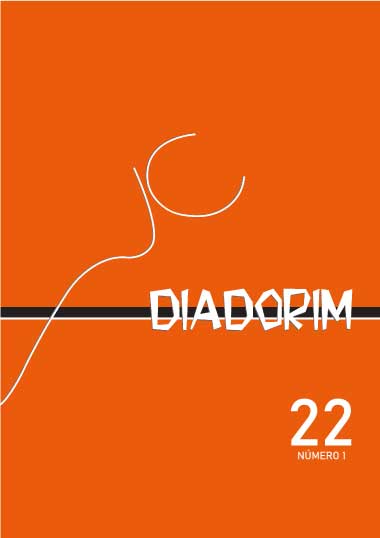Internationalization of languages and culture of indigenous peoples of the arctic in the global internet
DOI:
https://doi.org/10.35520/diadorim.2020.v22n1a32656Palavras-chave:
Globalization, Information and communication technologies, Multicultural environment, Indigenous peoples.Resumo
As globalization expands, the phenomenon of languages disappearance is becoming more critical. In the context of the information society development, the clash of globalization and national identity is acute. Information and communication technologies play an extremely important role in the balance of power between competing languages, and here the dominant languages have advantages to the detriment of others. To eliminate these trends, it is necessary to take urgent measures to support minority languages that are on the verge of extinction. This paper discusses ways to solve the problem and represent the languages and cultures of the indigenous peoples of the North and the Arctic on the global Internet. The article is devoted to the internationalization of the languages and cultures of the indigenous people of the North and the Arctic through the global Internet. The purpose of the study is the creation and use of the multilingual Internet portal www.arctic-megapedia.ru, which should integrate the languages and cultures of all indigenous peoples of the North and the Arctic in the global information space to the new multicultural communication of XXI century. For the implementation of the project, an internationalization model was used based on the terms “internationalization” and “localization” and their concepts adopted in computer science. The project “Digitalization of the Linguistic and Cultural Heritage of Indigenous Peoples of the Arctic” will be submitted to the Arctic Council for implementation in 2020-2023. Multilingual portal www.arctic-megapedia.ru should become a part of the world multicultural environment and organically integrate the languages and culture of the indigenous peoples of the North and the Arctic into the global information space so that they can fully represent their people, native language and culture in this multicultural environment of humankind. Localization of the project will be implemented by the creation of regional Internet resources on indigenous peoples, living in these territories and countries, subsequently integrated on a unified multilingual online portal www.arctic-megapedia.ru. The implementation of the project will be focused on promoting the achievement of the sustainable development goals of the indigenous peoples of the Arctic in the context of globalization.
Referências
BOL'SHOYTOLKOVYYSLOVAR' russkogoyazyka [Large explanatory dictionary of the Russian language] / S.A. KUZNETSOV, 1998. 1536p.
BOL'SHOYTOLKOVYYSLOVAR' russkogoyazyka, s izmeneniyamiidopolneniyami [Large explanatory dictionary of the Russian language, with changes and additions], 2010.
NOVEYSHIYBOL'SHOYTOLKOVYYSLOVAR' russkogoyazyka [Newest large explanatory dictionary of the Russian language]. St.P.-M.: Ripol-Norint, 2008.
PSIKHOLOGIYA Internet-kommunikatsii: uchebnoe posobie [Psychology of Internet communication: manual] / In: E. BELINSKAYA ( ed .). Moscow: MPSU Publ.; Voronezh: MODEK Publ., 2013. p. 192. - (Seriya "Sotsial'naya psikhologiya").
SIGANATULINI.M. Rol ' i mestonarodnoypedagogikivformirovaniietnicheskoyidentichnosti [The role and place of folk pedagogy in the formation of ethnic identity] // Real'nost' etnosa. Rol' obrazovaniya v formirovanii etnicheskoy i grazhdanskoyidentichnosti. MaterialyVIII Mezhdunarodnoynauchno-prakticheskoykonferentsii[ Reality of the Ethnos. Materials of the VIII International Scientific Practical Conference]. Saint Petersburg: Asterion Publ., 2006. - pp. 341-344.
SUPRUNOVA L.L. Prioritetnyye napravleniya polikul'turnogo obrazovaniya v sovremennoy rossiyskoy shkole [Priority directions of multicultural education in the modern Russian school] / Pedagogika Publ. 2011, no. 4. - pp. 16-28.Translation from the English article by Sarah Bajelani https://termin74.ru/articles/internationalization_2/
YAZYKOVOYE raznoobraziye v Kiberprostranstve: Rossiyskiy i zarubezhnyy opyt. Sbornik analiticheskikh materialov [Linguistic Diversity in Cyberspace: Russian and Foreign Experience. Collection of analytical materials] / E.I. KUZ'MIN, E.V. PLYS. Moscow: MTSBS Publ., 2008. pp. 111- 129.
ZHOZHIKOV A.V., ZHOZHIKOVA S.I. Yazykovoye I kul'turnoyeraznoobraziye korennykh malochislennykh narodov Severa v vek tsifrovykh tekhnologiy [Linguistic and cultural diversity of indigenous peoples of the North in the digital age] //Nauki o kul'ture v perspektive "digital humanities". MaterialyMezhdunarodnoykonferentsii 3-5 oktyabrya 2013, Sankt-Peterburg [Cultural Sciences in “digital humanities” perspective. Materials of the International Conference on October 3-5, 2013, St. Petersburg] / In: L.V. NIKIFOROVA, N.V. NIKIFOROVA (ed.). - Saint Petersburg: Asterion Publ., 2013. pp. 438-441.
Downloads
Publicado
Edição
Seção
Licença
Transferência de direitos autorais - Autorização para publicação
Caso o artigo submetido seja aprovado para publicação, já fica acordado que o autor autoriza a UFRJ a reproduzi-lo e publicá-lo na Diadorim: Revista de Estudos Linguísticos e Literários, entendendo-se os termos "reprodução" e "publicação" conforme definição respectivamente dos incisos VI e I do artigo 5° da Lei 9610/98. O artigo poderá ser acessado pela internet, a título gratuito, para consulta e reprodução de exemplar do artigo para uso próprio de quem a consulta. Essa autorização de publicação não tem limitação de tempo, ficando a UFRJ responsável pela manutenção da identificação do autor do artigo.

A Revista Diadorim utiliza uma Licença Creative Commons Atribuição-NãoComercial 4.0 Internacional (CC BY-NC 4.0).

